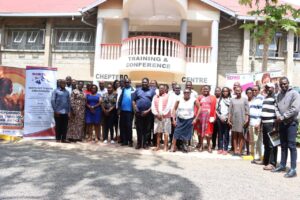Trans Nzoia County Partners With Consortium to train environmental conservation stakeholders
The county government of Trans Nzoia has partnered with the Adaptation (Ada) Consortium to train environmental conservation stakeholders committee on climate change management in order to deal with the emerging climate change being experienced in the county.
Speaking during the stakeholders sensitization meeting in Kitale, the CEC for water environment and natural resources Aggrey Chemonges said it would boost the climate change adaptation programme in the county hence mitigate some of the factors that has led to the climate changes being experienced in the country at the moment.
The CEC applauded the effort by the donors for supporting the county government of Trans Nzoia in coming up with policy guidelines on how to handle climate change in the county including how to implement some of laws and regulation hence enabling the county to roll out the environmental conservation activities.
Mr. Chemonges said that the department through the collaborative effort by the climate change financing have finalized the on the guideline policy on climate change financial management laws which will be in charge of the implementation of the climate change program in the county.
“In terms of legal framework, the county is now set to operationalize issues of climate change in the county and we are looking forward to the establishment of committees and different units to run the various activities on climate change mitigations” CEC Chemonges said.
He added that the training of the stakeholders on planning committee formations at the grassroots level will boost the efforts of ensuring the smooth implementation of the laws at the county and ward level.
The CEC said with the laws on the management of the climate change mitigation financing in place and with the establishment of the ward’s climate change committee members, the county is set to roll out the program in the county.
Chemonges added that the county government department of environment will also set a budgetary allocation every year towards activities to mitigate climate change in the county with the involvement of the locals at the ward level.
“As a department we have also set up a climate change unit. We are expecting funding from the World Bank called financing of locally led climate Action (FLOCA) where local communities will come up with actions to mitigate the effect of climate change” said Mr Chemonges.
Adaptation consortium programs manager Esperanza Karaho said they have trained the county planning committees on the establishment of County Climate Change Financing (CCCF) in supporting devolution and supporting climate change investment, the principal for climate finance and the criteria that the climate change investments need to follow.
Ms Karaho said after the training on climate change fund mechanism it is now for the county executive member to table the climate change fund regulations to the cabinet and to the county legislative arm the county assembly for them to be able to pass and adopt the regulations.
“We will then establish the wards planning committees training them and thereafter we can kick start the project implementation into each ward” Kiharo said





